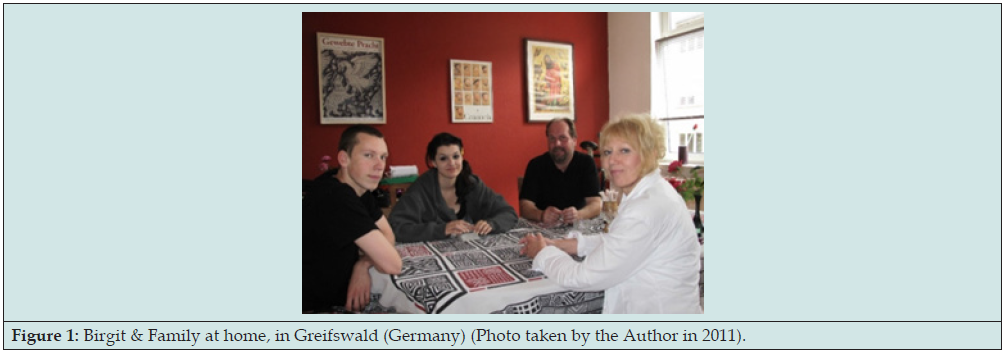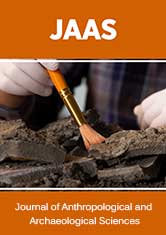
Lupine Publishers Group
Lupine Publishers
Menu
ISSN: 2690-5752
Short Communication(ISSN: 2690-5752) 
About Ossi, West & Friendship Birgit Dahlenburg (1959-2017) (In Memoriam) Volume 7 - Issue 4
João Vicente Ganzarolli de Oliveira*
- Professor and Researcher of the Tércio Pacitti Institute of the Federal University of Rio de Janeiro, Brazil
Received:December 12, 2022; Published: January 12, 2023
Corresponding author: Rosa Navas, Phd. In progress in Jiangsu University, China
DOI: 10.32474/JAAS.2023.07.000267
Abstract
Abstract
Postponed by almost half a decade, this article focuses on Ms. Birgit Dahlenburg, a German historian of art who was introduced to me by my friend Gerd-Helge Vogel in 2011. The following lines also address certain facts concerning friendship and Germany’s cultural identity [1].
Keywords: Birgit Dahlenburg; Germany; Ossi; Wessi; Friendship
Friendship is unnecessary, like philosophy, like art... It has no survival value; rather it is one of those things which give value to survival. C. S. Lewis
Half a Page
Half a page of basic facts is all the Wikipedia provides about Birgit Dahlenburg-better than nothing, I thought, in my attempt to collect data about that German historian of art, who was also a friend of mine since 2011. Our friendship is what most encourages me to write this paper. Nothing prevents me, however, from presenting you, dear reader, those same basic facts supplied by the Wikipedia. Here they are: “Birgit Dahlenburg studied German, art history and art didactics at the Ernst-Moritz-Arndt University of Greifswald. In 1986 she received her doctorate in art history and from 1987 worked as a research assistant at the chair for modern art history (Figure 1). From 1988 to 1989 Dahlenburg was head of the graphics department at the Zwickau Municipal Museum. In 1989 she was appointed university custodian and head of the academic art collection of the Ernst-Moritz-Arndt-University, where she was also a research assistant at the chair for modern art history from 1999 to 2006. From 2013 Dahlenburg was a board member of digiCULT-Verbund eG, a cooperative that aims to secure the cultural heritage in the long term through digital recording and dissemination. In addition, she was an active member of the German Museum Association, the International Council of Museums (ICOM) and the coordination office for scientific collections in Germany” [2]. As for her main publications, Birgit’s legacy is as follows: “Art possession and collections of the Ernst-Moritz-Arndt University of Greifswald. Ed,. Ernst-Moritz-Arndt University of Greifswald. Hinstorff Verlag, Rostock, 1995; The Croy carpet from the Ernst Moritz Arndt University of Greifswald. Thomas Helms Verlag, Schwerin 2000; with Dirk Alvermann: Greifswald heads. Scholar portraits and life pictures from the 16th to 18th centuries Century from the Pomeranian State University. Hinstorff, Rostock 2006; with Kurt Feltkamp: Freester fishing carpets from the Ernst-Moritz-Arndt University of Greifswald. Greifswald 2008; Artistically admired and persecuted by the state security - the surrealist Manfred Kastner (1943-1988). Greifswald 2008 [3].”
About Ossi and Wessi
Birgit was born in 16 April 1959 in Heldburg, a town of the German state of Thuringia, not far from the border of what is now the Czech Republic, aka Czechia. This means that Birgit was Ossi-“an informal denomination given to people who were born and raised in ex-East Germany; its counterpart is Wessi, used for those who were born and raised in ex-West Germany. Indeed, Ossi and Wessi (German pronunciation: [ˈɔsiː] = ‘Easterner’; German pronunciation: [ˈvɛsiː] = ‘Westerner’) are the informal names that people in reunified Germany call the former citizens of the extinct East Germany and West Germany, which before re-unification. These names represent the lingering differences between the two pre-reunification cultures, and Germany’s popular culture includes many Ossi-Wessi jokes and cliches. While some people in Germany may consider these names insulting, others regard them as part of the very German culture [4].”
Notwithstanding my familiarity with the orbis germanicus (I have already lived in the German part of Switzerland and, as a traveler, more than once have I visited Germany and Austria – countries where German is the official language), I am not in condition of recognizing (let alone underscoring) the cultural differences between Ossis (Easties) and Wessis (Westies). Among my German friends, some are (or were, as Birgit) Ossis, other are (or were, as the writer Peter Schmid, author of two nice novels, namely Der ver-botene Traum [“The Forbiden Dream”] and Schattenwald ([“Shaded Forest”]) Wessis. Apart from the obvious difference (Ossis have assimilated lots of Russian elements in their cultural background, whereas Wessis are more Westernized, so to say), I could not say in what precisely a Wessi is different from an Ossi.
About Friendship
What do we mean when we say that somebody is a friend of ours? The dictionary I have in my hands says that a friend is “someone who you know well and like, but who is not related to you.”, being friendship the name given to “the relationship between two of more friends [5].” As for liking someone, the same dictionary points out that the person you like must be “interesting, enjoyable, or attractive.”Enough from definitions! Friendship-just like all other important things that are really important in this short period of time that we call life-is something that lies beyond the scope of definitions. Nobody knows exactly what the word friendship means; but everybody does know exactly when what they fell for somebody is friendship or not. First came the thoughts and feelings; afterwards came the words, mental tolls that give us a pale idea of what things really are.
The Internet provides us with literally thousands of quotations concerning friendship. I do not know if the one I have chosen as epigraph for this little article (“Friendship is unnecessary, like philosophy, like art. It has no survival value; rather it is one of those things which give value to survival.”) is the most beautiful or profound among the many other candidates, so to say. No doubt remains for me, however, that this is the most suitable for the goal I had in mind, namely that of connecting friendship and survival. Since January 29th 2017 the Ossi Birgit Dahlenburg is no longer a citizen of the Federal Republic of Germany. Since then she survives and inhabits in eternity, where time is no more, and geopolitical+cultural frontiers are irrelevant, given that all things, without exception, cease; requiescat in pace.
References
- I take the opportunity to express my gratitude to Ms Daniela Bradke for her friendly and valuable collaboration during the preparation of this text.
- https://de.zxc.wiki/wiki/Birgit_Dahlenburg.
- https://en.wikipedia.org/wiki/Ossi_and_Wessi.
- John Sinclair et alii. (1995) The Collins-Cobuild English Dictionary, Londres, The University of Birmingham/Collins-Cobuild/HarperCollins pp. 678-679.
- Id p. 967.

Top Editors
-

Mark E Smith
Bio chemistry
University of Texas Medical Branch, USA -

Lawrence A Presley
Department of Criminal Justice
Liberty University, USA -

Thomas W Miller
Department of Psychiatry
University of Kentucky, USA -

Gjumrakch Aliev
Department of Medicine
Gally International Biomedical Research & Consulting LLC, USA -

Christopher Bryant
Department of Urbanisation and Agricultural
Montreal university, USA -

Robert William Frare
Oral & Maxillofacial Pathology
New York University, USA -

Rudolph Modesto Navari
Gastroenterology and Hepatology
University of Alabama, UK -

Andrew Hague
Department of Medicine
Universities of Bradford, UK -

George Gregory Buttigieg
Maltese College of Obstetrics and Gynaecology, Europe -

Chen-Hsiung Yeh
Oncology
Circulogene Theranostics, England -
.png)
Emilio Bucio-Carrillo
Radiation Chemistry
National University of Mexico, USA -
.jpg)
Casey J Grenier
Analytical Chemistry
Wentworth Institute of Technology, USA -
Hany Atalah
Minimally Invasive Surgery
Mercer University school of Medicine, USA -

Abu-Hussein Muhamad
Pediatric Dentistry
University of Athens , Greece

The annual scholar awards from Lupine Publishers honor a selected number Read More...





